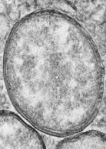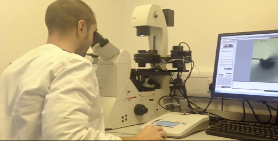Wolbachia mosquitoes and dengue control – from lab to field
With the support of a Wellcome Trust Translation Award, Prof Steve Sinkins is undertaking field trials to test the use of Wolbachia transinfections to control the transmission of dengue virus in Malaysia.
Wolbachia are naturally occurring bacteria that are very common and widespread in insects and some other invertebrates. They are found inside host cells, not in the environment, and are not transmitted contagiously between insects. Instead Wolbachia is inherited by offspring from their mothers – usually at very high rates, such that all the eggs a female lays will also carry the bacteria.

Wolbachia manipulate the reproduction of its hosts. Males are a ‘dead end’ host from which Wolbachia cannot be transmitted, but nevertheless it uses males to its advantage by making their sperm unable to successfully fertilize eggs that do not contain Wolbachia inside them. This is known as cytoplasmic incompatibility. The consequence is that female insects that carry Wolbachia have a major advantage – they can mate and produce offspring successfully with any male in the population - while in contrast females that do not carry Wolbachia are rendered effectively sterile if they mate with a Wolbachia-carrying male. Using this mechanism, Wolbachia are able to spread until they reach very high population frequency. Some strains are also able to block the transmission of viruses such as dengue, Zika and chikungunya by mosquitoes, and this has led to the application of Wolbachia to disease control.
 Of the two main species that transmit dengue, Zika and chikungunya viruses worldwide, Aedes aegpyti does not naturally carry Wolbahcia while Aedes albopictus carries two low-density strains. However both species can support the high-density Wolbachia strains that can block virus transmission. Because it cannot survive outside cells, Wolbachia infections in a new host species are created using microinjection, to transfer cytoplasm from donor Wolbachia-carrying mosquito or Drosophila eggs into freshly laid Aedes eggs.
Of the two main species that transmit dengue, Zika and chikungunya viruses worldwide, Aedes aegpyti does not naturally carry Wolbahcia while Aedes albopictus carries two low-density strains. However both species can support the high-density Wolbachia strains that can block virus transmission. Because it cannot survive outside cells, Wolbachia infections in a new host species are created using microinjection, to transfer cytoplasm from donor Wolbachia-carrying mosquito or Drosophila eggs into freshly laid Aedes eggs.
 We have now created and characterized a number of lines of Ae. aegypti and Ae. albopictus carrying various different Wolbachia strains, some of which block the dissemination and transmission of dengue, Zika and chikungunya viruses with very high efficiency. From these, the lines chosen to take forward into field trials have the most favourable combination of virus transmission-blocking capactiy, stable maternal transmission and low fitness cost to the mosquito (making them easier to spread).
We have now created and characterized a number of lines of Ae. aegypti and Ae. albopictus carrying various different Wolbachia strains, some of which block the dissemination and transmission of dengue, Zika and chikungunya viruses with very high efficiency. From these, the lines chosen to take forward into field trials have the most favourable combination of virus transmission-blocking capactiy, stable maternal transmission and low fitness cost to the mosquito (making them easier to spread).

Wolbachia Malaysia

Our translational work in Malaysia, supported by the Wellcome Trust, targets wild Aedes aegypti and Ae. albopictus mosquito populations to render them unable to transmit dengue, Zika and chikungunya viruses. This will be done by releasing mosquitoes containing virus transmission-blocking Wolbachia strains, to initiate Wolbachia population spread; the bacteria will reach high frequency and then remain at a very high level long term, such that re-application is not required. This approach is therefore a sustainable and cost effective way to combat dengue, as well as being a safe, environmentally friendly form of biocontrol.

We are working with a team at the Institute of Medical Research (IMR) in Kuala Lumpur, led by Drs. Nazni Ahmad and Lee Han Lim, and Prof Ary Hoffmann at the Univeristy of Melbourne. The program includes mosquito population characterization; community engagement to ensure full support; mass rearing and a release phase of 6-12 weeks at each site; and molecular monitoring of Wolbachia population frequency and its effects on virus transmission.

